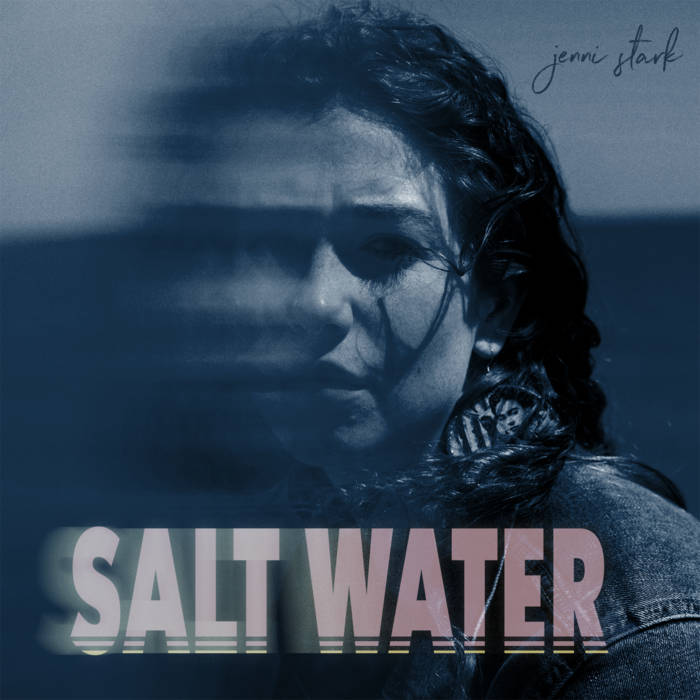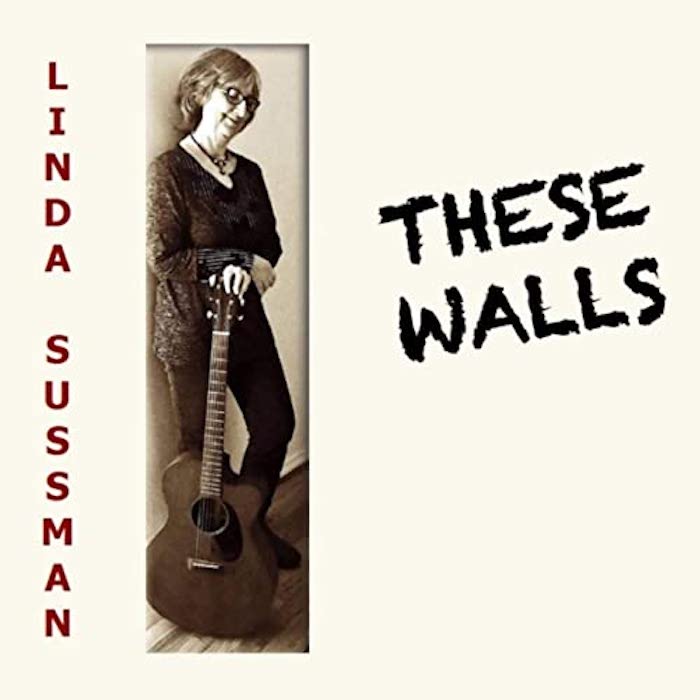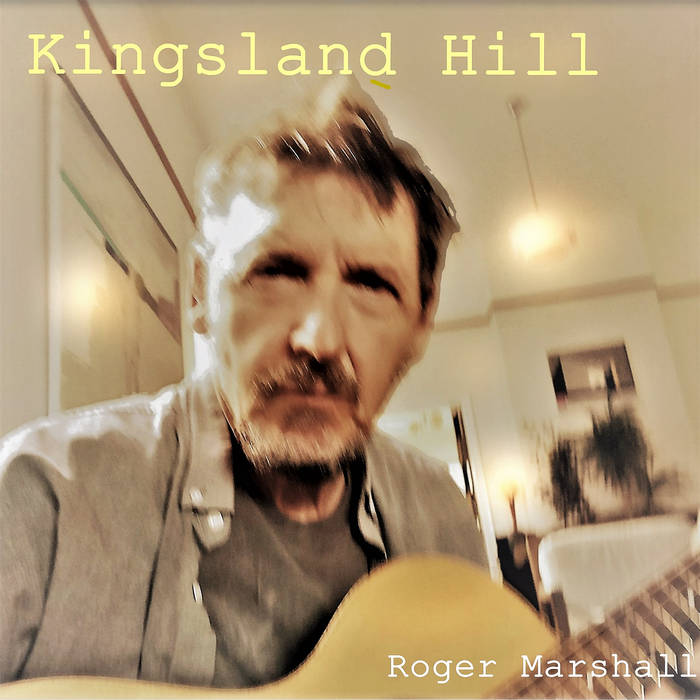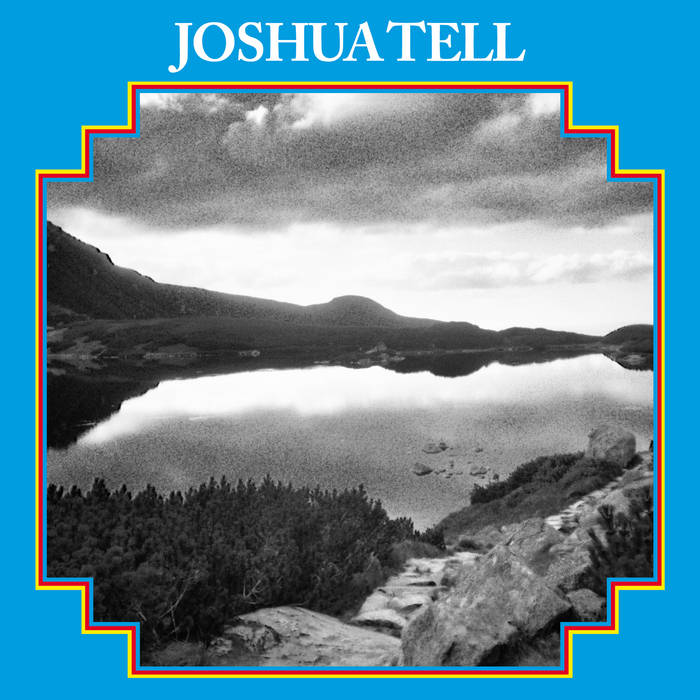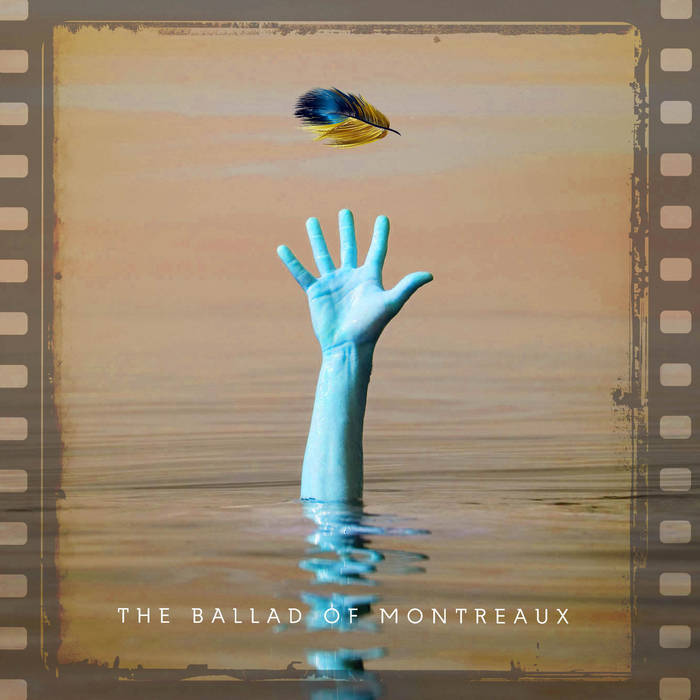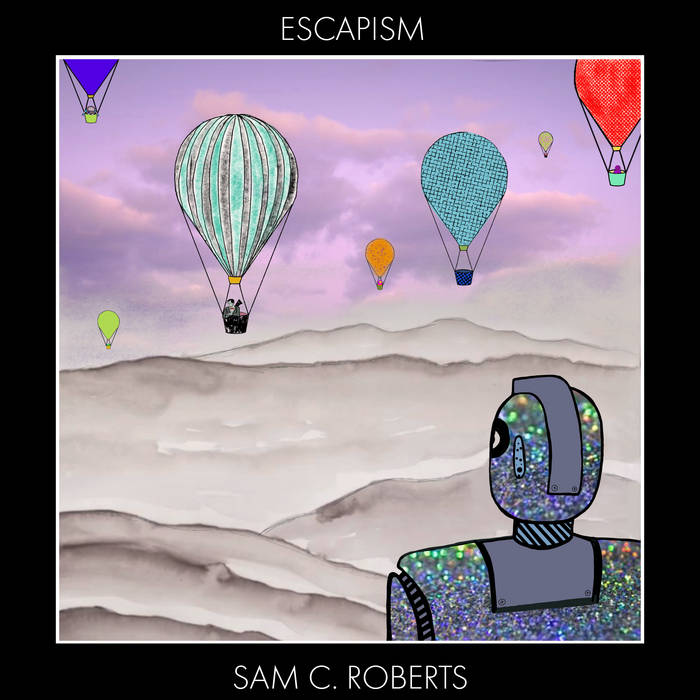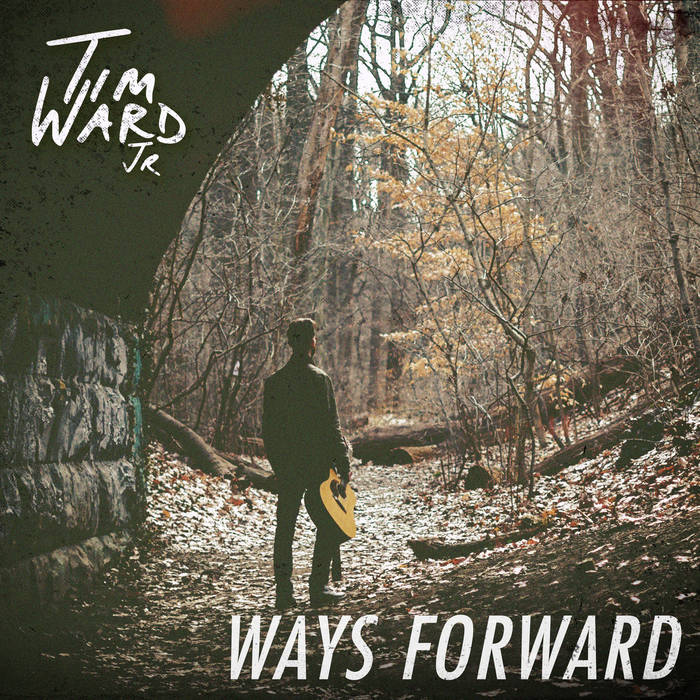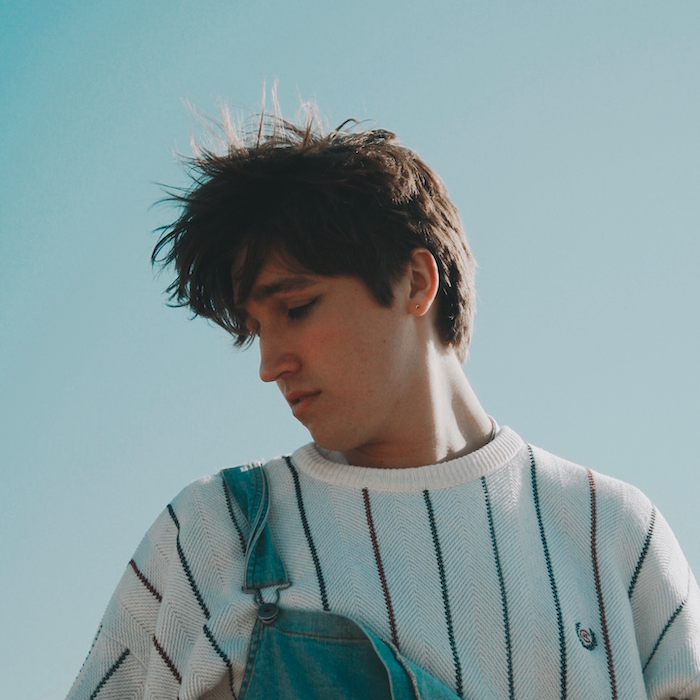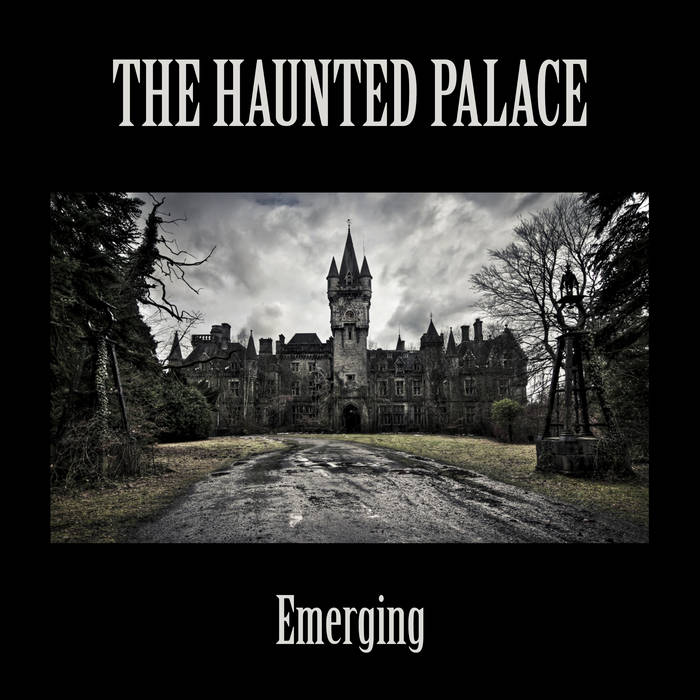|
I’ve talked about how powerful the creative process can be for an artist, both on this site and in personal conversations. In my opinion the creative process, no matter what the domain of art, has the potential to bring perspective, solace and much more. There’s no doubt in my mind that creating authentic art has benefits for the artist as well as the people interpreting the art.
Jenni Stark, who happens to come from my own neck of the woods in Chicago, seems to understand what I’m talking about. Stark who recently released Salt Water says: “I didn’t set out to write an album, I didn’t even really set out to write a song. But I found myself writing what I desperately needed to hear.” Her music is a mix of genres like pop, folk and singer/songwriter. There’s a contemporary quality to the production which is felt more on certain songs. The title track “Salt Water” opens up the album and seemed to serve as more of an intro. This track is more otherworldly and ethereal sounding because of some of the heavy effects she puts on her vocals. There’s a sort of dark and serene soundscape behind the vocals. On “Cold” things start to feel more earthbound. It starts with gently picked guitar patterns. The vocals aren’t going through major effects but there’s some nice reverb. It's definitely a serene and tranquil song. That being said it does pick up some energy with percussion and bass, but for the most part stays within that emotional energy. “Constellation” is a little more pop oriented than the previous songs. It’s more upbeat as well with a sort of classic singer/songwriter type of quality. There’s nice use of reverb here as well all over the song which makes it feel nostalgic. I thought this was a highlight. “I Know Better” goes for a more intimate and melancholy feel. The lyrics definitely felt more hopeful than the music. “Underneath” is another intimate song but transitions into a very epic song towards the end. I was not expecting a rock song but “Watch Me” delivers. There’s sort of a badass ’80s quality to this in the spirit of Joan Jett. “Glow” is an emotive and atmospheric track with lots of space for the instrumental parts. “Topo Chico” is almost straight pop while “Moonrise” is much more country oriented and borderline bluegrass. Stark closes with the cinematic “Hurricane” which sounds huge. My only critique is that Stark often jumps to different genres from song to song rather than combining different genres into a signature sound. The direction of the album when listening sequentially felt piecemeal although not always. Some songs like “Watch Me” or “Topo Chico” felt like they could have landed on a different release. On that note I enjoyed all the songs. She nails the things she attempts although the atmospheric, dark and intimate songs were my personal favorites. Overall, I thought this was a great album. There's a ton of emotion pouring through these songs. The emotion she was trying to convey through the creative process certainly was felt on this end and that’s what art is all about. Recommended.
0 Comments
I’ve been a musician for decades and when big events happen you notice other artists often write about them. Once the pandemic hit, it took about a week for songs, EP’s and albums to flow about what people were feeling. I’ve coined it “pandemic albums” and since then I’ve reviewed hundreds of albums about what people are experiencing. On the recent release These Walls Linda Sussman explains: “About half the tracks were written in the early days of COVID-19 lockdown and are a reflection of the world while in isolation.”
The album is a mix of blues and folk. In Sussman’s own words she says “music crosses lines of alternative-folk and blues and whose songs span universal themes such as love, heartache, triumphs and social justice.” That’s about right but in my opinion this felt more like straight folk. The album starts off warm and fairly joyous with “These Walls.” There’s a mix of guitar, piano, bass and drums. The arrangement was well done and I loved the brush work on the drums. I’ll admit I had to warm up to Sussman’s vocals when I first heard them on this song. They did grow on me with repeated listens and as the album progressed I appreciated them more and more. “Eye of the Storm” is sort of a lowdown dark mix of blues. In a different dimension I can imagine Jim Morrison singing a song like this. I thought her voice was interesting against this style and sort of goes against the norm. It worked out well. Sussman however sounds really at home on “Catch Me If I Fall” which is a folk song. This felt like a classic ’70s ballad with warm guitar picking and other instrumentation that creates a serene and comforting mood. “Tomorrow Blues” plays a timeless blues riff and feels like nothing else but the blues. “Join Hands” is unapologetically unifying and wholesome, and throws in the sort of standard social justice sentiment musicians have been singing about since the ’60s. It was a highlight. The percussion sounds perfect against the flamenco style guitar. I also loved the hook which was very catchy. As the album progresses I thought there were a number of highlights. The slide guitar on “My Baby” hit the mark while “Cocoon” has a tropical vibe and flirts with Bossa Nova. The closer “Sounds” contains fantastic guitar work and thought-provoking lyrics and Sussman even sings in Spanish at points. One thing I did notice was that the songs did feel genre specific. For instance the blues inspired songs really embraced the standard criteria that defines the genre. Same goes for folk. There wasn’t too much bleed from either genre into the other. The production and recording quality was exceptional. I really have no critique here other than keep working with those engineers. This is a great album where you can tell there was a lot of work was put into it. As they say, the proof is in the pudding. The songs were heartfelt and sincere and felt honest. I think this album will resonate with fans of folk and blues. Take a listen.
A couple of years back we reviewed Situation Normal by Roger Marshall. Marshall is back with a new release entitled Kingsland Hill. This album is a mix of genres like blues, folk and more. Marshall is ambitious with this release. Marshall has been compared to legends like Dylan, Cohen and Waits. Those really do seem to be an appropriate reference. Marshall’s vocals sound somewhere between Waits and an older Cohen. He has a thick baritone that drips with what I could describe as “a man who has been through some shit.” That’s at least the feeling I get.
The album starts with “Rain Song” and is a mix of country and blues. There’s the rattle of a tambourine, and killer guitar groove and steady beat. The vocals are great not just because of how they are delivered but the melodies as well. I was not expecting some of the smooth Bossa Nova on “Songbird” but that’s what I got. This song has fantastic percussive elements and the horns feel like a pillow of comfort and solace. Marshall’s vocals sound exceptional and his strained baritone sounds perfect against the music. “Let It Lie” contains some precise and gentle guitar picking, pads and more that create a pensive and borderline meditative mood. “Be On Your Way” is country inspired with more of a Johnny Cash type vibe. Marshall continues to switch it up from song to song but nothing in left field. The lush and warm “Stepping On My Shadows” is nostalgic and refers to things like memory, meaning and where our path has led. As the album progressed I felt engaged and excited to hear what was next. Some of the other highlights include “Enemy Lines,” “Headwind” and “Watching The World Unwind.” The songwriting and delivery is on point here. Marshall is an experienced musician and you can really feel it on these songs. Marshall handles melancholy like a pro by avoiding sounding melodramatic and woe is me. There’s an authenticity to these songs you can’t deny. Highly recommended.
Joshua Tell is an American singer/songwriter based in Germany since 2012, where he studied classical guitar and built a collection of his own original folk songs. He’s toured with musicians from across the globe, and his self-titled debut album Joshua Tell is available both on vinyl and by download.
Tell explains that this album features some of his favorite compositions from his 20’s: “I’d been carrying (these songs) around for quite a while, and wanted to record before losing touch with them.” As influences he mentions country icon Kris Kristofferson along with folkies Sufjan Stevens, Paul Simon, Gordon Lightfoot and Phil Ochs. Most of the album was recorded live with his band in three days, with the next nine months spent adding additional songs and overdubs. His band includes Spanish guitarist Jaime Velasco, double bassist Pierce Black and drummer Nico Stallmann, plus special guests. To get the obvious pun out of the way, the artist’s name is Tell, and he does indeed tell stories… but I mean he REALLY tells stories! Most of his songs have lots of lyrics, and while that’s not unusual for folk or country songs, Tell obviously takes his time crafting his narratives which are all printed on his Bandcamp page. “For the Tree Buds” starts the album on a hushed, solemn footing. Tell sings and picks a minor chord pattern on his acoustic totally solo. This short track is the most recent composition on the album, and equates the changing of the seasons to the cyclical nature of existence. The next two songs move the album into a storytelling groove, which makes sense as they were actually written for a radio play about outlaws during the Civil War. “Cat Dalton” kicks in at double time and introduces Tell’s musical guests. The opening lines will give you the idea: “The coach, it pulled into the town, it opened up its door / a lady with an eyepatch stepped down, black the cloak she wore / a bona-fide cold-blooded killer, weathered by the war / she still stood just to settle one last score.” The lyrics only get better from there, with the richness of a good dime-store novel. The folk-country arrangement fits the story quite well with especially nice slide acoustic guitar. “Bayonets and Banners” continues the story, now back to a slower contemplative tempo. This song so vividly describes the horror of the Civil War that I could imagine it as part of a Ken Burns-style documentary. This track also features Nathan Bontrager on cello. An early high water mark! “An Echo” reminded me of John Prine. Its bluegrass instrumentation (featuring Philipp Keck on dobro and banjo) and the overall feel again takes me to the dust bowl, though I’m fairly certain Tell’s story of love found and quickly lost takes place in modern times.“Stay a While” is a duet with experimental electric guitarist David Sophora and is based on a poem by Yeats. It’s a nice track but in all honestly I prefer Tell’s singing voice to his narrative style.“This Time with You” is more traditional folk-country with both a Dylan and Dire Straits vibe. “Bag Salad” is a humorous story-song about lost baggage at the airport, which Tell performs as if he’s just sitting around with his pals (which includes Pit Lenz on harmonica). “Mr. Please!” features Joon Laukamp and Miclen LaiPang on sweet country fiddles for an upbeat hoedown; Keck again shines on dobro and banjo. “Winter Song” reverts to Tell’s quiet, foreboding style with atmospheric, snoring cello by Nathan Bontrager. It’s a close thing but I may prefer Tell’s slower songs to his rave-ups. “Frank and Joan” is something of a surprise folk-rock ballad which owes more than a little to the Beatles, making for a nice contrast to the more country cuts. The final song here “Rosy Cheeks” is also the oldest composition, and brings the set to a gentle conclusion with just vocals and picked acoustic for a ’70s folky lament. This is a great collection of heartfelt songs, and I loved the idea of Tell raiding his back-catalogue to present a mosaic of emotions from earlier in his life.
Montreaux is a Wolverhampton, UK- based heavy rock band that was formed in 1981. Yes 1981, the year I was born. The band apparently broke up in 1984 and then reformed in 2019. That might be one of the craziest things I’ve read about a band. Either way the band is making up for lost time on The Ballad of Montreaux.
The band states: “A completely self made project with multiple influences throughout including Love, Bruce Springsteen, Beatles, Stones, Who, camel, Pink Floyd and Van Morrison together with our own original unexpected twist.” I definitely picked up on a lot of these influences. “Men of the Dead'' is up first and this song starts with a riff that sounds a bit like Van Halen. There are some unexpected changes however that utilizes synth-like orchestration. The song transitions back into an ’80s sounding verse with powerful vocals a little reminiscent of Bruce Springsteen at least in spirit. “I Don’t Know Where I’m Going” is a little brighter and joyous sounding. It sounds good on the band. The vocalist's natural voice meshed well with this style. There’s some dynamic orchestration which again felt like it was coming from a keyboard but worked out well. “Arrival/I Want More” is like a mix between an ambient Pink Floyd style atmosphere that transitions into a dynamic organ infused romp. I liked the vocals where it repeats ”I want more.”“Another Day” mixed rhythmic guitar patterns and orchestral melodies. The other parts of the song have more of an American classic rock quality. “Ballad of Montreaux” is definitely the centerpiece. It’s a little over eight-minutes long and has the most overt Pink Floyd type quality. The song embraces atmosphere, cosmic and serene soundscapes and lead guitar which drips with reverb and delay. It’s also the most thought provoking and cerebral song on the album. “Flashlights Revisited” has a lot going, perhaps a little too much. The song moves fast and rocks. They go back into Pink Floyd ballad mode with “Hero” and sound really good here. This was one of the best vocal performances. Last up is “Fighting” which has more of a rock edge to it. I’m always a fan of good comeback stories. I love the fact the band reformed after decades and nailed it. Fans of the aforementioned should appreciate this. Take a listen.
Become A Fan
Sam C. Roberts is a musician and composer based in Birmingham, UK who recently completed his album Escapism. Roberts says his primary musical focus is on the bass guitar, and in finding ways to expand the role and sonic palette of his instrument. He also produces “atmospheric pieces that combine abstract sound, field recordings and music to create absorbing, film-like narratives.” The songs themselves are about “dreaming and distraction through fantasy; all the music is rooted in escape from reality.” Though Roberts never uses the terms progressive or fusion, those are the closest categories that his music falls into for me with strong echoes of The Mahavishnu Orchestra, Return To Forever, Weather Report and Herbie Hancock.
Full disclosure: this is the kind of album where the playing and arrangements are of such a high level that my mouth hung open in amazement with each cut. Roberts himself sings and plays bass, but also contributes some guitar and keyboards with Nick Hartland on drums. Most parts were recorded at Roberts’ home studio (along with final mixing and mastering), with drums tracked at The Kennel Studios in South Somerset. “ROBOTRUMBLE (Boss Fight)” opens the album much like Queen’s “Ogre Battle” began Queen II, with the same kind of manic energy and ear-popping chops. Roberts says this is a tale of “sentient robots winning their freedom and striking out into new worlds” and it certainly plays that way. The bass in the main section carries parts you’d expect of a rhythm guitar with the synths providing the Byzantine melodies. Roberts declaims his lyrics like Big Brother sending out a noontime broadcast. For all its complexity, this song actually has a hummable theme that I really enjoyed. Now that we know roughly what to expect, “Blue Hydrangeas” continues the prog-y template of the first track with the exception that guest guitarist Alistair Blair carries the melodies with an insinuating fuzz tone; in the B section he goes for a quieter, more crystalline quality. The third section becomes harder rock with extreme processing on the guitar that resembles a synth, followed by some incredible axe heroics from the Al DiMeola school. If you’re looking for guitar, this is your track. “Dunes Divided” is said to be a “sci-fi inspired story,” and I assume the main inspiration is Frank Herbert’s Dune which has just been made into a new movie. Roberts takes almost two minutes up top to create a mini symphony for his bass with textures that recall the great Jaco Pastorius. The bass continues to dominate the lyrical section, approximating Egyptian folk music and textures. “Drifter” features mellow background sounds against a paramilitary beat over which Roberts speaks his lyrics like a story; eventually the sentences begin to repeat and interweave with themselves for a hypnotic effect. “Silent Window” is in some ways a traditional smooth jazz vocal tune, but it’s being played in an extremely low key (perhaps inspired by the bass) so that the effect is deep, thick and all-encompassing. The moments when Roberts sings along with his bass lines gave me goosebumps. The finale “Take to the Water” is perhaps the biggest surprise, as it’s very close to rock or even punk with some hints of Captain Beefheart in the chorus. The energy tilts toward overdrive from beginning to end though the verses are sung by Roberts in his pop style. The hardcore riffs just don’t quit… until they finally do. Overall an excellent collection of songs and a fine album for any lover of prog rock or jazz fusion with enough surprises to keep everyone else guessing.
Tim Ward, Jr., a Philadelphia, PA, based singer/songwriter and guitarist, spent several years playing in a local rock cover band where he was able to further hone his skills as a musician and vocalist. Since 2017, he has been a regular in Philly’s open mic and small venue scenes. For his first solo EP Ways Forward Ward enlisted a full band backing of musicians and friends to help him enrich his sound. The musicians backing him include Genevieve Green (piano/backing vocals), Tim Lulorfs (bass/backing vocals), David Olimpio (keys), Thomas LaForgia (cello) and Shane Woods (drums/percussion). There is a whole lot to experience in this six-track EP collection from indie folk, pop rock and a touch of spirituality. This emotional EP is filled with stories from Ward’s personal life and you will definitely see some very familiar stories as these tales intersect with yours. Ways Forward will not only have you reminiscing but also rocking along to these pensive yet resonating melodies.
Ways Forward opens up to “Wanderer’s Hymn,” where simple acoustic guitar and Ward’s vocals start us off. The layers of guitars and vocals come in feeling very intrinsic. Slowly as some percussive beats arrive, the music then opens up and becomes more expansive. The vibe feels very folksy in vein. The cello provides a moody underpinning layer. Sure enough more acoustic guitar renderings come in on “Just Enough.” The sole sound of Ward’s vocals are also highlighted here. Next, a full band backing points to a fuller embodied sound. As the drums and piano come through, the sound becomes more sweeping and expansive. Feeling very pop rock in vernacular, this was another crowd-pleasing number. The electric guitar solo on this piece was another rousing highlight. Chord progressions on the acoustic guitar makes for a dynamic sound on the start of “Release, Relief (Into The Blue).” As the sound of electric guitar weaves in, the sound grows fuller. Once Ward’s vocals came in, this felt more like some straightforward rock. There was a grittiness to his vocals that pointed in this direction. I enjoyed the energy on this track. Next, a sauntering groove arrives on “On Down The Road.” The laid-back feel to the music points to a very easy-going sound. There was a hint of nostalgia to this song as Ward reminisces on the past and sings with feeling about the future. This felt like a heartfelt number. On “Anatomy,” a moody piano piece opens up this track. I got Tim Burton soundtrack vibes right away from the piano melody. Lastly, a more folk country tune enters on “I’m On My Way.” The music once again has a sauntering slant to it. There was a jauntiness to the tune that would make it great to get moving to. Ward hints at more to come with this hopeful closer. Ward invites us to listen to Ways Forward, a collection that takes us on a journey through the mind of an artist, musician and poet. You can tell Ward is an artist that pays particular attention to song craft as these tracks feel like a lot of thought, care and attention were behind these renderings. There is no extra fat, just the bare bones of the production hitting you straight heart and soul. This EP proved to be a great start from the artist and I look forward to seeing how he continues to evolve his sound in a follow-up release in the not-so-distant future.
Every week we mention a couple of artists that are worth your time to check out that were not featured in our weekly reviews.
Artist Album Rating Twisted Ecstasy Twisted Ecstasy 3.6 Bleeding Star Be Your Ghost 3.8 the lethargics Rough South Short Stories 3.7 Protomythos Narratives 3.8 Sam Hignett Now it's Your Problem 3.7
Colin Bracewell is a twenty-year-old musician from Minneapolis who recently released Valley. Bracewell mentions: “About my experiences of living in Fresno, California (San Joaquin Valley) and Minneapolis, Minnesota. Eventually coming back in contact with individuals from both places and seeing what has changed, who has stayed, what is lost and what was discovered from the last five years.” Fair enough.
The EP starts with “The Cage” and the song contains a heavy beat, guitars, synths and basically a lot of instrumentation. It’s a dynamic song with intimate moments and very grand and epic crescendos. Good start. “Not Today” is much more lush and reminiscent of Bon Iver. I say this in terms of the production and approach to the space between the notes. It felt like a highlight to me. The vocals are on point and the guitar work was smooth. Some of the lyrics felt saccharine but nonetheless very good delivery. “Let Me In” is another good song where the dynamics play an important role. I again thought of Bon Iver in how the production was approached. “Page” is more or slow burn and excels because of the subtlety. I loved the guitar work and in general just how the song unfolds. “In The Valley” is perhaps the most experimental and yes the dynamics are central here. There are moments of lone vocals which sometimes get thrown into a fire with heavy instrumentation and sometimes not. It’s a very cool approach. The young artist is off to a good start. His music sounds fresh and modern while still containing sincere emotion. He successfully avoids cliches most of the time and establishes a pretty solid signature sound. I hope to hear more soon.
The Haunted Palace formed in 2020 consisting of duo Erika Batdorf and Richard Feren, who are looking forward to reeling audiences in with their ghostly renderings of darkwave and goth-pop inspired by their favorite 4AD music and similar music from the late ‘80s and early ‘90s. Feeling very dark and moody in vibe, their debut four-song EP Emerging gives us a first look into what this band is all about. Usually, the instrumentation was written by Feren first, then Batdorf accompanied the music with lyrics and vocal melody lines she would write down, then both artists would get together to shape the vocal and harmonies and finally everything would be mixed by Feren. This seems to work out as the haunting soundscapes on this EP hints at what might lay on the shadowy abyss. Emerging EP takes us deeper into the unknown, highlighting sounds using mostly software instruments. But with so many shades and nuances to their sound, it comes across as sounding more. Batdorf’s vocals shift and change colors according to the track, and it is her versatileness that ties everything together. Batdorf and Feren have created something very interesting: both dark and dream-like, something to enrich your waking dreams and entrench yourself in your nighttime reveries – there is just something very otherworldly about this EP.
Emerging EP starts off with “You Are My Seas,” where ghostly synths rush into the sounds here. As the screeching of gulls and ocean waves comes in, the haunting vibes become more present. The ambiance is eerie as soft vocals slowly come in. Batdorf’s vocals at moments reminded me of Enya. There was a very new-agey approach to her vocal style. As the music progresses, more of the moody atmosphere comes through. Feeling very gothic and dark, this intro definitely piqued my interest to hear more. On “Walking Away,” some static-y guitars sound out here. As the vocals come in, the beats also gain traction. There was a very dark sonic environment to this track. I enjoyed the immediacy of the vocals. I thought this gave the track a very dramatic air. On “The Next Year In Venice,” the sound is lush sounding. Batdorf’s spoken word-like vocals recites some French phrases. Next, her vocals come right in. This time she mostly sings in English. The sounds of the bell tolling sets in with an unsettling vibe. This was a very atmospheric piece with tons of mood and ambiance. What sounds like a xylophone trickles in on “Sweetheart Slow Down.” Next, some beats softly pulsate in the background as eerie ghost-like whispers enter. Then Batdorf’s theatrical vocals arrive that sound like something straight from a Broadway production. As percussive beats come in, the music becomes more sweeping and epic. This was another number filled with ambiance. There is a lot to experience on this expansive closer. Feren and Batdorf are both theater artists and there is a very theatrical aspect to these tracks. There is also a whole lot of atmosphere to these songs and it is no wonder since Feren has lent his hand as a sound designer for theater & dance, is a composer for numerous film scores and is a lifelong horror bluff. Batdorf is a playwright, director, actor and professor at York University’s theater department, and this EP owes a lot of its theatricalness to her. Leaning onto a lot of eerie moods and dark elements, this is the perfect accompaniment to enjoy your Halloween celebrations. The ghostly vocals and haunting music have just the right amount of chill factor to get you in the mood for this season’s spooky factor. If chilling gothic vibes is right down your alley, then this will be something just for you. Give this a spin today! |
Critique/insightWe are dedicated to informing the public about the different types of independent music that is available for your listening pleasure as well as giving the artist a professional critique from a seasoned music geek. We critique a wide variety of niche genres like experimental, IDM, electronic, ambient, shoegaze and much more.
Are you one of our faithful visitors who enjoys our website? Like us on Facebook
Archives
July 2024
|

